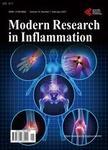Evaluation of Some Inflammatory Biomarkers in Male Albino Wistar Rats Following Ingestion of Crude Oil and the Role of Bee Honey, Vitamins C and E
Evaluation of Some Inflammatory Biomarkers in Male Albino Wistar Rats Following Ingestion of Crude Oil and the Role of Bee Honey, Vitamins C and E作者机构:Department of Physiology Faculty of Basic Medical Sciences University of Uyo Uyo Nigeria Department of Biochemistry Faculty of Basic Medical Sciences University of Uyo Uyo Nigeria
出 版 物:《Modern Research in Inflammation》 (炎症(英文))
年 卷 期:2016年第5卷第3期
页 面:55-62页
学科分类:1008[医学-中药学(可授医学、理学学位)] 1006[医学-中西医结合] 100602[医学-中西医结合临床] 10[医学]
主 题:Crude Oil Inflammation Erythrocyte Sedimentation Rate C-Reactive Protein Antioxidants
摘 要:Evaluation of some biomarkers of inflammation in male Albino Wistar rats following ingestion of Nigerian Bonny Light Crude Oil (NBLCO) and the effect of antioxidant supplementation was the focus of this study. Forty-eight adult male Albino Wistar rats weighing 150 - 180 g were randomly divided 8 per group into: group I (control) oral gavaged 3 ml/kg of normal saline;group II received 3 ml/kg of NBLCO;groups III, IV and V received in addition to 3 ml/kg of NBLCO 1 ml/kg vitamin C, vitamin E and 3 ml/kg of honey bee respectively;group VI received 3 ml/kg of honey. After 28 days of treatment, all animals were anaesthetized with chloroform and blood collected by cardiac puncture for analysis. Results showed that NBLCO administration significantly increased erythrocyte sedimentation rate and C-reactive protein while supplementation with antioxidant significantly reversed such effects (p 0.05). NBLCO significantly reduced platelets and fibrinogen levels compared with the control group (p 0.05). Interestingly, the vitamin supplementation significantly reduced platelets and fibrinogen levels compared to group II (NBLCO) (p 0.05). Honey supplementation on the other hand significantly reduced platelets and fibrinogen compared to group II (NBLCO) (p 0.05). From the results obtained it is concluded that ingestion of NBLCO has the potential to induce development and progression of inflammation but could substantially be mitigated by supplementation with antioxidant vitamins C, E and honey.



